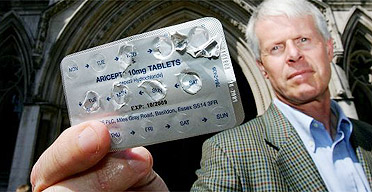
Drug companies and campaigners yesterday lost a high court appeal for people in the earliest stages of Alzheimer's to be prescribed on the NHS a £2.50-a-day drug which is said to provide relief from the symptoms and respite for families.
In a complex judgment, the body that decides which treatments should be available on the NHS was told its guidance breaks the law by discriminating against people with learning disabilities and those who speak limited English.
The ruling means the drug will not be available for people in the earliest stages of the disease, allowing the decision of the National Institute for Health and Clinical Excellence (Nice), that Aricept's benefits are too slight to justify prescribing, to stand.
The companies that manufacture Aricept and the Alzheimer's Society said the decision was "disgraceful". Nice said the first judicial review of its processes was an endorsement which "strengthened" them. It follows several rows over Nice decisions on drugs.
The organisation decided in November that three acetyl cholinesterase inhibitors - Aricept, Reminyl and Exelon - should only be prescribed to patients in the moderate but not earliest stages of the disease. Eisai and Pfizer, which make and market Aricept, supported by patient groups, sought a judicial review.
Yesterday, Paul Hooper, managing director of Eisai, said: "The guidance Nice has issued is morally reprehensible. They are denying patients access to early treatment and that is wrong. This is about patients, not profits. For Nice to deny treatment to patients with mild Alzheimer's disease is disgraceful."
The Alzheimer's Society said it was frustrated at the decision.
Andrew Dillon, chief executive of Nice, said: "The ruling strengthens Nice by endorsing our approach to evaluating drugs. Our guidance stands and the drugs continue to be recommended only for people with moderate Alzheimer's disease, but the court has asked us to clarify guidance when it is used for certain groups." He promised to reissue the guidance to ensure that it was "crystal clear".
The court rejected five allegations that Nice had behaved "irrationally and unlawfully" in its decision-making and that its processes were "procedurally flawed". But Mrs Justice Dobbs said the scoring system used by Nice to assess patients was less likely to grant prescriptions for the drug to people with other disabilities or language difficulties, and therefore was discriminatory.
Nice was ordered to amend its guidance to prevent any breach of its duties under the Disability Discrimination Act and the Race Relations Act.
A spokeswoman for the Disabilities Rights Commission said: "We know from investigations we've done that people with learning difficulties face discrimination in the health system and we would condemn any guidance which did this. It's good the judge has recognised this."
The coalition of drug companies and patient groups was ordered to pay 60% of the legal costs and refused leave to appeal.
Harriet Millward, deputy chief executive of the Alzheimer's Research Trust, said: "We are devastated that these drugs will remain unavailable on the NHS to people with early stage Alzheimer's when they might benefit from them."
'I need it so I can keep running'
John Stevenson, 60, was diagnosed with Alzheimer's seven and a half years ago. He was immediately prescribed Aricept, which he and his wife Mary credit for the fact that he carried on working as a chartered surveyor for two years, has given three daughters away and last autumn completed the Great North Run in two hours 32 minutes.
"It's a tremendous benefit. We have had a real quality of life to enjoy. He knows his five grandchildren," says Mrs Stevenson speaking from the Royal Courts of Justice in London yesterday after the verdict upheld last year's decision that people who are diagnosed now with early Alzheimer's won't be prescribed Aricept.
Mrs Stevenson says: "Two weeks ago he went back for his six-monthly check up and his memory had not declined at all. His speech is a little worse but his memory was just the same as six months ago. The drug works for him. It has staved off the worst years for us and given us a little more time together and me a bit more time to prepare myself."
But doesn't Nice have to make tough decisions to ensure there is enough money left for drugs and treatments which are more effective? "Come on," she says. "It's £2.50 a day."
Mr Stevenson speaks falteringly. "Without having the medication I wouldn't be able to be here now. It's that bad. If I didn't have it it would mean more things I wouldn't be able to do. I need it now so I can keep on running."

